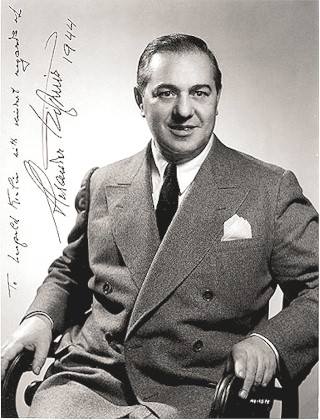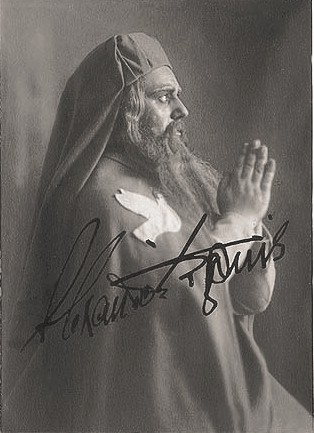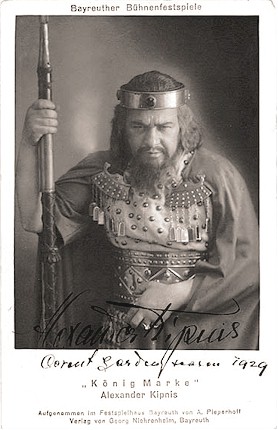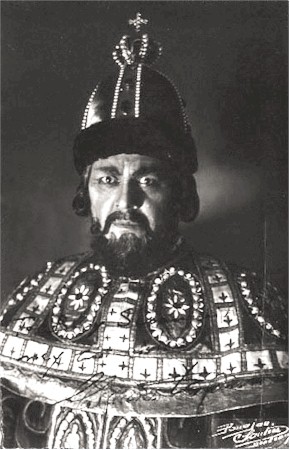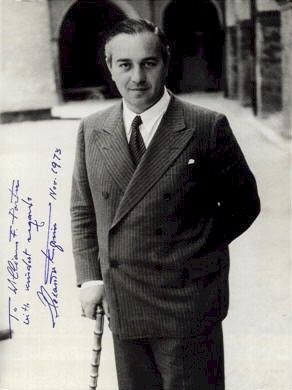Ukrainian-American bass, 1891 - 1978
Biographical notes: “My father was born into a pitifully poor family in the Ukraine and had little going for him as a young boy except for a rather sweet soprano voice. One day, a visiting cantor from Bessarabia heard the lad singing in the local synagogue choir and persuaded my father’s mother, with the promise of some payment, to let him take the child back to his own synagogue to sing. During this period of a few years, my father was befriended by one of the choir’s male singers. The town of Novybug, with its largely unpaved streets, had particularly muddy paths when the post-winter thaws came and whenever it rained. In exchange for singing lessons and the rudiments of reading music, my father would scrupulously scrub the rubber boots of the older singer. One of the pieces the older man introduced him to was “Der Leiermann,” the haunting final song from Schubert’s Winterreise. My father was affected by the sad, almost frozen tune of the organ grinder, and in later life he often related how, as a young boy, he loved songs in minor keys and could not understand why anyone should ever want to write in the major mode.” (Igor Kipnis)
As Gurnemanz Alexander Kipnis studied conducting at the Warsaw Conservatory and went to Berlin where he received vocal tuition by Ernst Grenzebach (other students were Lauritz Melchior and Max Lorenz). He appeared at Hamburg in 1916 and at Wiesbaden from 1917 to 1922 and became the leading bass at the Berlin Städtische Oper (1919 - 1929). Thereafter he joined the Vienna State Opera and the Berlin State Opera and was engaged at the Bayreuth Festival. He was admired as an outstanding Wagner and Mozart singer as well as a great interpreter of Italien and Russian roles. He soon became an accomplished lieder singer. By 1937 he was a familiar artist in most of the world’s leading opera houses, especially in America. He became an American citizien in 1931. He was a regular member of the Chicaco Opera from 1923 to 1932 and made a late debut at the Met as Gurnemanz in 1940. There he also appeared as King Marke, Arkel, Hermann, Hagen, Hunding, Ochs von Lerchenau, Sarastro, Nicalantha in Délibes’ Lakmé and Boris Godunov. He stayed at the Met until 1952. He appeared in extensive and tremendously successful concert tours throughout America. After his retirement he became a renowned vocal coach at the College of Music in New York.
As King Marke
A late Met debut as Boris Godunov His appearances in Russian opera were surprisingly rare, and often in translation: In a performance of Boris Godunov in Chicago in 1925, in which Feodor Chaliapin sang the title role in Russian, Alexander Kipnis sang the role of Varlaam in Italian. When he did eventually sing Boris in Russian at the Met in the 1940s, the rest of the polyglot cast sang in Italian!
Comment:
He is not only an exceptional bass and singer but also a great musician. His musicianship led him to Mozart and Wagner, Mussorgsky and Debussy, Verdi and Rossini, Schubert, Brahms, Wolf, all with fine results. I do not know another bass who equals him in refinement, expressivity, flexibility, dignity and sonority. A special characteristic is the apparently limitless range of colours in a powerful voice
capable of sustained dramatic statements. In addition to this came a guttural handling of words, a characteristic of his mother tongue, but it never distracted, indeed rather hightened the
attractiveness of his extraordinary voice. You will notice a frequent use of portamento, and aspirations in his later years.
What attracts me most is his personal warmth and intensity. He is capable to achieve deep-minded expression and profound insight into every role or song.
Listen to the arias of Cornelius’ Der Barbier von Bagdad. He sings them with the right sense of humour and charme. Go to the incomparable and deeply moving interpretations of Brahms’ Vier
ernste Gesänge, Wolf’s Michelangelo-Lieder or the Schubert lieder. Hear him as Gurnemanz, one of the most beautiful Wagner recordings ever made, Fritz Wolff as Parsifal is his partner (by
the way a much underrated singer). He is simply overwhelming in Fiesco’s Il lacerato spirito. His Boris is very dramatic and in my opinion, he overdoes the declamatory passages, but still he gives
a very impressive portrait.
“As a young boy, I remember marveling at the way my father shrieked that horrifying cackle at the end of the Méphistophélès Serenade (Vous qui faites l’endormie), and listening to the way he does it on this recording, I still wonder how he managed it.” Igor Kipnis
|
||||||||||||||||||||||||||||||||||||||||||||||||||||||||||||||
